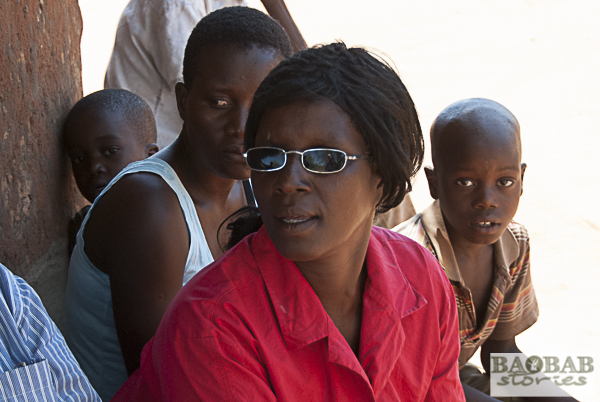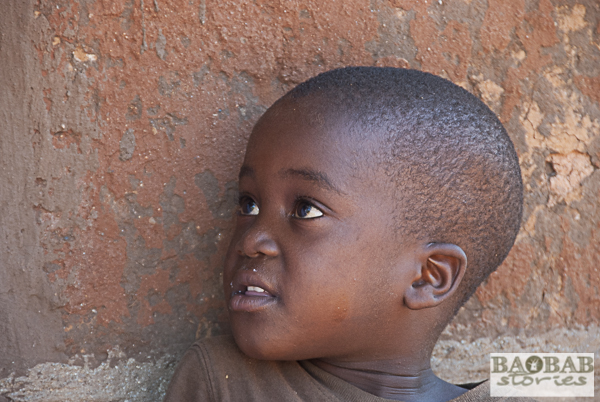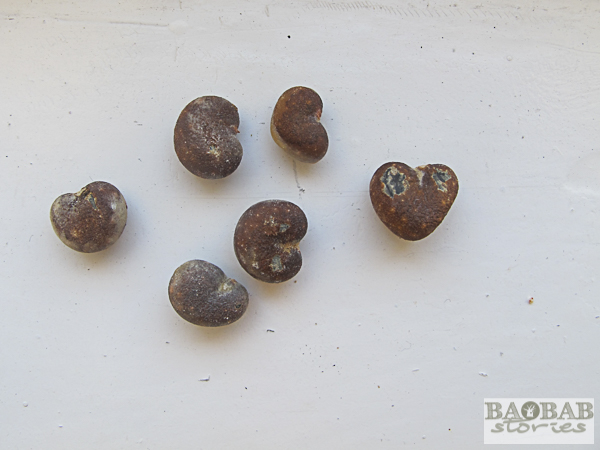“I did not collect much baobab fruit but I wish I had because the little bit of income that I earned helped me to support my children”, says Rosemary Katandi about the opportunity to sell baobab fruit. She plans to increase her collecting efforts for the next baobab season.
Apart from this she is a registered fruit collector for B’Ayoba, a baobab processing company based in Harare. Rosemary lives with her family in Kajokoto Village. She is a neighbour of Rerai Mundengoma whom we visited earlier this day. As we stop at Rosemary’s house the heat builds up continuously and all we seek is the tiniest bit of shade. It is 8:30 am and I do not want to think about what temperatures will be like around noon in this area.
The goats have all decided to seek shelter in the shade under a grain storage hut. Later on we learn that the day before goatlings and fledglings have died because they could not cope with the high temperatures.
Women Registering as Fruit Collectors
The fruit collector is busy finishing her household task and we try to make ourselves comfortable on a bench in a tiny strip of shade front of a hut. Her husband, Ephson Makonyo, keeps us company. He recalls that at first, when B’Ayoba came into the area to buy baobab fruit from the villages, everybody who wanted to participate had to register.
From programs distributing food aid they were used to the fact that men as traditional heads of household were registered with their name. He reveals that they had thought it would be the same with B’Ayoba. But when they found out that women could be registered in their own name things started to change. Suddenly the women were eligible to earn money from collecting baobab fruit.
Baobab Makes a “Big Difference”
As Rosemary joins us she says that this makes a big difference to her since she feels more independent. “I did not collect much but I wish I had because the little bit of income that I earned helped me to support my children”, she says. For the next fruit collecting season she plans to put more effort into this kind of business.
“This project has impacted women in a major way”, the fruit collector states. Her female colleagues could afford more things to meet basic needs and she continues: “Some bought clothes for their children but the major thing that people used the money for is to pay school fees”.
With my extensive background in development I have heard many things and I get sceptical about hearing the same thing over again. I wonder whether “sending kids to school” is something every “donor” gets to hear in the area. Which, to a point would be understandable because donors like to support schooling projects. But Fran Patsika reassures me that it really makes a difference for the people and that all want to provide a better life for their children. And as we know, education – among others – is a great factor for a good start in life.
Traditional Uses of Baobab
The conversation moves on and I am keen to hear about the more traditional uses of baobab. As seems to be most common for baobab powder, people use it to make porridge. And as I have found out myself it tastes great. Children take the powder, mix it with water, add some sugar and consume it like that.
“Baobab tastes nice when you crush the seeds, grind them into a powder and make kind of a butter with it. It makes a nice paste similar to peanut butter and we like to eat it as relish”, says Rosemary Katandi about how she uses baobab.
Healthwise the baobab provides as well. The people in Kajokoto Village used to treat malaria with it. If a child fell ill from malaria they used baobab powder dissolved in water. Rosemary says it brings down the temperature level. That is some interesting information I would like find out more about. I belief that the powder does have the properties to bring down fever – but can it really deal with the parasites flooding a body suffering from malaria?





